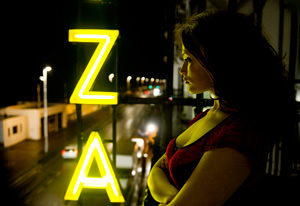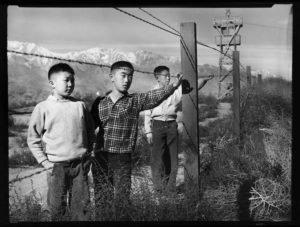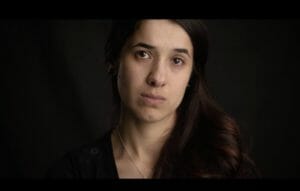Neil Jordan Returns to Bloodsuckers With ‘Byzantium’
It’s been nearly 20 years since "The Crying Game" auteur Neil Jordan directed Brad Pitt and Tom Cruise in "Interview With the Vampire."
It’s been nearly 20 years since Neil Jordan directed Brad Pitt and Tom Cruise in “Interview With the Vampire.” Back then vampires were associated with the novels of Anne Rice rather than those of Stephenie Meyer. Jordan now returns to “sucrients” — to borrow a word from the script of his latest film, “Byzantium,” a tale of 200-year-old mother-daughter vampires who come to dwell in a boardwalk town that’s seen better days. Starring Saoirse Ronan (nominated for an Academy Award as the youngest sister in “Atonement”), Gemma Arterton (“Clash of the Titans”), Sam Riley (“Brighton Rock”) and Jonny Lee Miller (TV’s “Elementary”), “Byzantium” tells the story of the two women at the crossroads of their life together and how they became immortal. All the while they are pursued by an ancient order of male vampires who have forbidden women from creating, and the two are relentlessly hunted.
I recently talked with Jordan from his home in Dublin about “Byzantium” as well as his diverse career, which includes 17 feature films with an Academy Award for best screenplay for 1992’s “The Crying Game.” The Ireland native has also directed for the stage and written fiction, and created a series for cable TV, Showtime’s “The Borgias.” “Byzantium” was released in the U.S. on June 28.
Margaret Barra: What is the source for “Byzantium”?
Neil Jordan: I was sent the script, which was written by Moira Buffini from her play “A Vampire Story.” I thought it was odd and interesting that there were some elements of my other films in it — past and present, rundown holiday towns, two women sharing a history, storytelling from two points of view, vampires. It was almost uncanny.
MB: Also a rundown seaside resort. I’ve noticed that in several of your films.
NJ: Yes, in “Mona Lisa,” “The Miracle,” even “Michael Collins.” And I used a seaside town in my early short stories. I was born in one. My father was a teacher with three-month summer holidays. I remember them well.
MB: Were there major challenges in the script?
NJ: The 18th-century dialogue couldn’t come across as clunky. The two women have to have distinct voice. The daughter, Eleanor (Ronan), has a very distinct voice, and we see the story mostly through her. I decided not to work as a writer, which I don’t normally do, but I wanted to make sure that “Byzantium” was a horror film, not just a vampire movie.
MB: There’s also a dark sense of humor to the film.
NJ: There is, but I don’t have a humorous bone in my body.
MB: “Interview With the Vampire” was also laced with some moments of dark humor, and so was your second film, “The Company of Wolves.” I remember reading that [“Interview With the Vampire” author] Anne Rice told you, “The Company of Wolves” was Lestat’s (Cruise’s character) favorite movie.
NJ: (Laughs) Yes, she did say that to me.
MB: In the 29 years since you made “The Company of Wolves,” it has developed quite a cult following. You wrote the script for it with the late great English fictionalist Angela Carter. How did that come about?
NJ: We met at a literary festival in Dublin, a Borges conference. We were both fans. She had written a short radio play from her collection of stories, “The Bloody Chamber.” I liked the story, but it was too short to make into a movie. I proposed to make it a story within a story, and she responded well to that. We each worked on scenarios then came together in London. We put it together and we had a script.
MB: Her story, “The Bloody Chamber,” is also about a mother and daughter, like “Byzantium.” Were you thinking of that when you made the film?
NJ: No, oddly, that didn’t occur to me. That was the one story we didn’t use in “Company of Wolves.” I didn’t think about that in “Byzantium.” Shortly before she died, Angela started a vampire story, “Vampirella.” Sadly, it was unfinished. I think if Angela had written a vampire movie it would have been “Byzantium.”
MB: When you directed your first film, “Angel,” in 1982, Ireland didn’t really have a film industry. What was your introduction to filmmaking?
NJ: A number of British companies began filming in Ireland to cut costs and hired local people as creative consultants. John Boorman did that for me when he was making “Excalibur.” Before that I thought movies were made by gods or machines; it hadn’t occurred to me that humans actually wrote movies. I learned so much from John. It was with his backing as executive producer that Britain’s Channel 4 gave me the go-ahead for “Angel.”
MB: Some of your films deal with otherworldly elements, while others are grounded in reality, particularly aspects of Irish history. For instance, “The Crying Game” and “Michael Collins,” the biopic of the man most responsible for creating modern Ireland. There must have been a storm of controversy in Ireland over that film.NJ: Huge. It became the center of argument and discussion about the origins of the birth of a nation. Truth is that it was a shabby war. It was an interesting but quite uncomfortable experience for me.
MB: Were you accused of having some kind of agenda?
NJ: I was accused of a lot of things. The truth is, I just wanted to make the film about the violence and not the politics.
MB: You also created a series, “The Borgias,” which you produced and wrote and directed several episodes of. Was it originally intended as a feature film?
NJ: Yes, but I couldn’t find a backer. I jumped on the TV opportunity. The miniseries is a wonderful format. In many ways a two-hour movie can be restricting, but with the series on cable I got more than 30 hours of storytelling time. I really wanted to tell a story about religion and power and how power can’t operate without justifying itself. With Jeremy Irons at the center of it, it’s like watching a family of vampires. I didn’t want to make them nice.
MB: The Borgias themselves weren’t exactly relatable.
NJ: (Laughs) No, maybe that’s why we didn’t get a huge audience.
MB: You’re also a novelist and writer of short stories. When you get ready to write a book, do you withdraw from the world? Is that a different process from writing a movie script?
NJ: I’ve published seven or eight books [eight counting the “Neil Jordan Reader,” a compilation of his work.] It’s all just writing. Same as writing for a cable TV series. But with a piece of fiction, you have more of a chance to rewrite and revise.
MB: Is that an advantage over film?
NJ: When you’re filming, you may get something different from an actor than you’re expecting and things often turn out different than how you originally wanted them. You can’t control it all. With fiction you have no excuses.
MB: Are there any casting changes in your movies that you regret, someone you wanted to use, but couldn’t?
NJ: Well, originally Sean Connery was going to play the lead in “Mona Lisa,” which would have put him together again with his friend Michael Caine. That would have worked, but it would have made for a much different film.
Terence Stamp did a wonderful cameo appearance in “The Company of Wolves,” an uncredited appearance. I had asked Andy Warhol to do it, but he had things going on and he couldn’t leave New York. He had just been shot. Things can work out strange.
Margaret Barra is a film student at the New York Film Academy. She has written for TheAtlantic.com and True West magazine.
Your support matters…Independent journalism is under threat and overshadowed by heavily funded mainstream media.
You can help level the playing field. Become a member.
Your tax-deductible contribution keeps us digging beneath the headlines to give you thought-provoking, investigative reporting and analysis that unearths what's really happening- without compromise.
Give today to support our courageous, independent journalists.






You need to be a supporter to comment.
There are currently no responses to this article.
Be the first to respond.